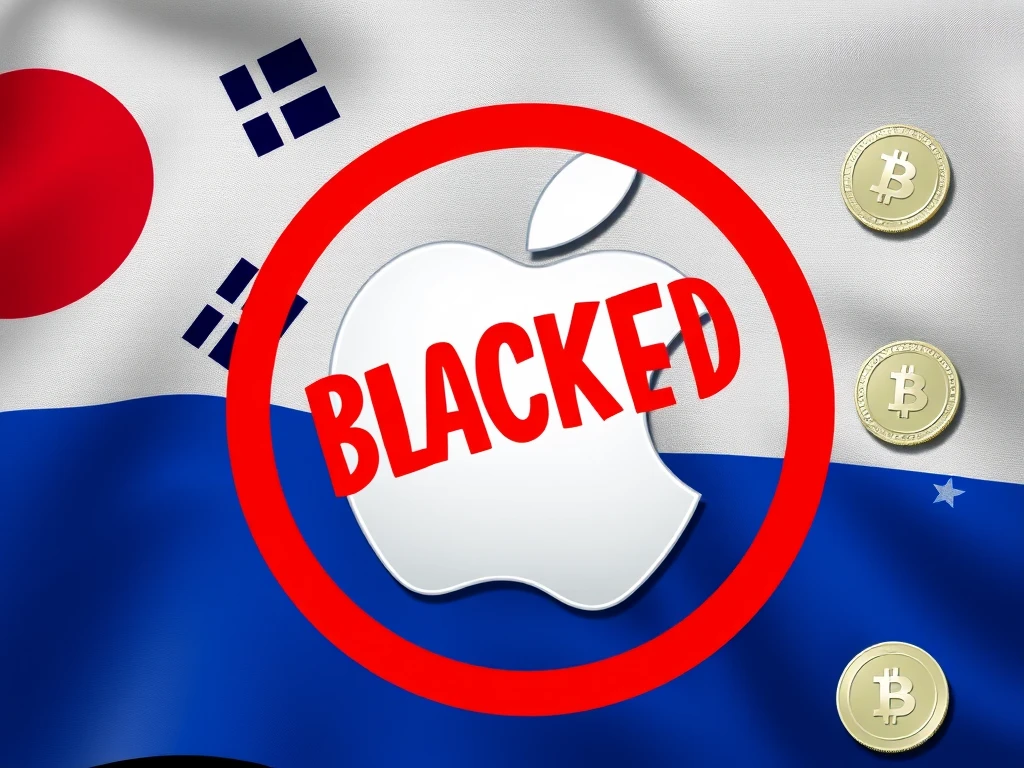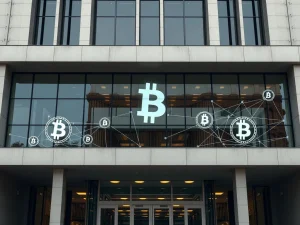Shocking Ban: South Korea Blocks 14 Crypto Exchanges on Apple Store

Is South Korea turning up the heat on the crypto world? In a shocking move, the Financial Services Commission (FSC) has reportedly blocked 14 crypto exchanges from the Apple Store in South Korea. This action, revealed just days after a similar ban on Google Play, signals a significant escalation in regulatory pressure on digital asset platforms operating within the country. Are your favorite exchanges on the list? Let’s dive into what this means for you and the future of cryptocurrency in South Korea.
Why is South Korea Blocking Crypto Exchanges on the Apple Store?
The official report, which surfaced on April 14th, points to unregistered operations as the core reason behind this latest crackdown. These 14 crypto exchanges are accused of functioning as ‘overseas virtual asset operators’ without proper registration in South Korea. The FSC, through its Financial Information Analysis Institution (FIU), is doubling down on efforts to block access to these platforms. Their aim is clear: to shield users from potential financial risks and combat money laundering activities.
This move isn’t happening in isolation. Just weeks prior, Google Play also barred 17 unregistered exchanges on March 26th. Notably, exchanges like KuCoin and MEXC have been caught in both sweeps, highlighting a consistent regulatory target. The FSC has even published a list of 22 platforms deemed unregistered, with 17 already blocked on Google’s marketplace, and now 14 more on the Apple Store.
| Platform | Status on Google Play | Status on Apple Store |
|---|---|---|
| Unregistered Crypto Exchanges (Total 22) | 17 Blocked | 14 Blocked (including KuCoin, MEXC) |
What Does This Apple Store Ban Mean for Crypto Users in South Korea?
According to the FSC report, the immediate impact on users is twofold:
- New Downloads Blocked: You won’t be able to find and download the apps of these 14 crypto exchanges on the Apple Store in South Korea.
- App Updates Restricted: If you are an existing user with these apps already installed, you will no longer receive updates. This could lead to functionality issues and potential security vulnerabilities over time.
The FSC is sending a strong message: operating without registration carries severe consequences. They explicitly state that ‘unreported business activities are criminal punishment matters,’ with penalties reaching up to five years in prison or a hefty fine of 50 million won ($35,200). This is not just a slap on the wrist; it’s a serious deterrent.
The Bigger Picture: South Korea’s Stance on Cryptocurrency Regulation
This series of bans underscores South Korea’s increasingly firm stance on cryptocurrency regulation. The FIU and FSC have been actively considering sanctions against unregistered exchanges since March. These sanctions are now materializing as app store blocks, signaling a proactive approach to enforcement.
Remember, in South Korea, any entity involved in cryptocurrency sales, brokerage, management, or storage must register with the FIU. Compliance is not optional; it’s a legal mandate. Failure to register and adhere to reporting requirements opens businesses up to significant penalties and sanctions.
This regulatory push comes at a time when cryptocurrency adoption in South Korea is soaring. As of March 31st, over 16 million South Koreans—more than 30% of the population—are crypto exchange users. Projections suggest this number could exceed 20 million by 2025. Furthermore, even a significant portion of public officials (over 20%) are invested in cryptocurrency, holding assets valued at $9.8 million.
Navigating the Evolving Regulatory Landscape
South Korea’s regulation of the cryptocurrency market is clearly intensifying. For users, this means staying informed and ensuring compliance with local laws. For exchanges, particularly those operating internationally, understanding and adhering to South Korean regulatory requirements is now crucial for market access.
This latest Apple Store ban is a clear signal: South Korea is serious about shaping its cryptocurrency environment. The question now is, what further steps will regulators take, and how will the global cryptocurrency landscape adapt to these evolving rules?









